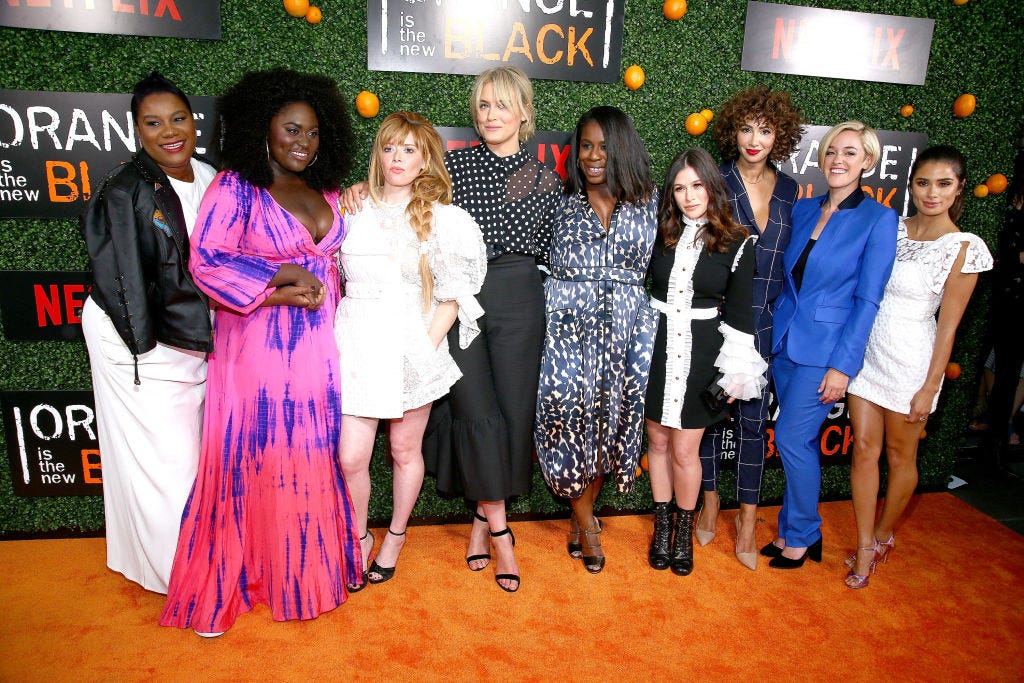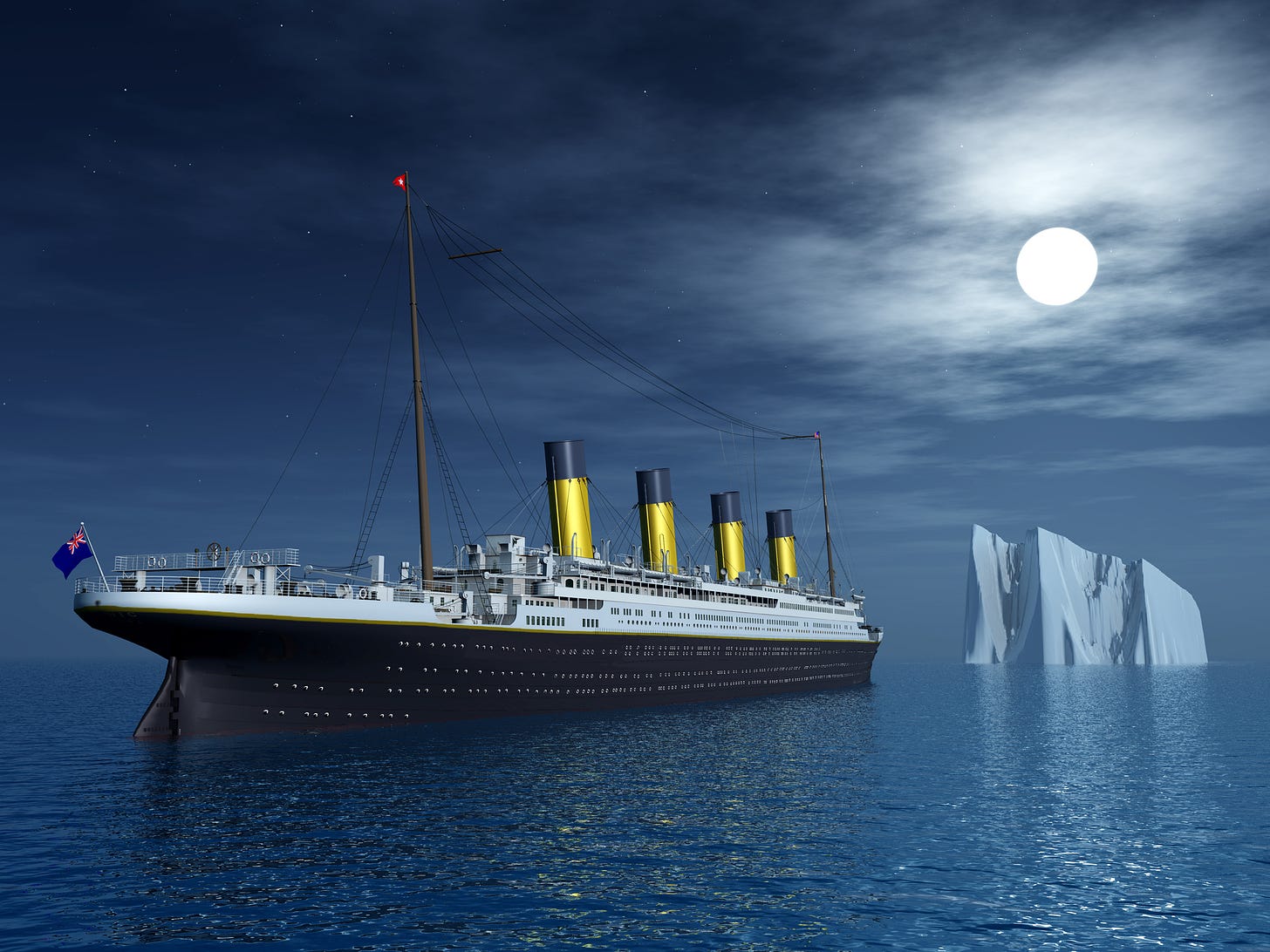Too big to fail? Not so fast. A showrunner's cautionary memo
Alena Smith is the creator and showrunner of Apple TV+’s Dickinson.
Hollywood is broken. More than half a trillion dollars has been wiped off the market value of the world’s biggest media companies this year, while, on the streets, hundreds of thousands of writers and actors are on strike, bringing the industry to a grinding halt at the moment when it most needs to prove its resilience. As the oddly mismatched mega-companies who currently produce, own, and distribute TV shows and movies fumble to align themselves on basic issues of minimum compensation and worker protection, along with the looming technological shifts of A.I., it has become clear that the only goal these corporations have in common is to gain market power and then exploit it; that is, to monopolize. This monopoly power, once grabbed, is used to lower costs and hedge risk for Wall Street investors, primarily by reducing or eliminating the bargaining leverage of artists and independent producers; by continuing to consolidate or vertically integrate along different and conflicting lines of the business; and by raising prices for the consumer — all while the entertainment they sell continues to decline in cultural relevance. Without regulation of these monopolies, Hollywood will succumb to a death spiral, planting a stake in the heart of the entertainment industry — one of America’s most lucrative exports, whose stories and stars have defined our culture for the past century or more.
The monopolistic streaming system, as it turns out, works for nobody in Hollywood — not the execs, not the shareholders, and not the audience. Even the most successful creators of TV and film are screwed in this arrangement.
The story of the streaming wars has been widely told by now, but I’ll provide a short recap. In the pilot episode of this limited series (so to speak), TV and film’s “great disruption” was kicked off by Netflix, who came raging into the business with a firehose of speculative cash, unleashing the biggest spending spree in the history of the industry. Netflix did so while deploying the classic Silicon Valley strategies of predatory pricing, vertical integration and hoarding of data in order to grab market share and make it impossible for the so-called “legacy media” companies (translation: those dinosaurs who still needed to make a profit off of entertainment) to compete. Netflix — like Uber, and yes, like WeWork — was selling a story: a story of unlimited growth and infinite scale; of monopolistic market domination. As long as interest rates remained at zero and subscription numbers kept going up, Wall Street bought the story. And so did the old guard of legacy media, who, tossing aside a century’s worth of experience and relationships in the notoriously unpredictable entertainment business, one by one threw their hats in the streaming ring, seduced by the promise of unwavering growth, each starting their own (often amusingly-named) direct-to-consumer subscription “content” platforms.
Bamboozled

Artists, too, were bamboozled by Netflix’s sexy new model of overpaying everyone up front in order to exclusively control the back end and keep any quantifiable audience reponse hidden, globally, forever. And once Netflix made this model the new normal, other companies followed suit. Now there were no more Nielsen ratings, no more box office numbers, no more publicly-available feedback loop of any kind to reveal to anyone — artists, executives, audience, critics — which of the ever-mounting heap of shows or movies were actually being watched and enjoyed. To make matters still more murky, Amazon and Apple joined the money-burning carnival, setting up in-house branding operations disguised as entertainment studios that were really just diversified “value-adds” to the products and bundles that form the core of their massive tech ecosystems. (My show, Dickinson, was one of just four series to launch Apple’s global streaming service in 2019, and to this day I have no earthly clue how many people have seen it, nor what value my near-decade of creative labor generated for the company. Not only do I have no metrics for my own success, I don’t even know how Apple would determine those metrics in the first place.) In their mad rush off the digital cliff, these companies transformed Hollywood from a high-wage, high-profit, hits-driven industry into a low-wage, low-profit, subscription-driven one. They also broke the basic bargain at the heart of show business, which is that creative artists and independent producers will share in the financial success their work creates.
How This Ends
So we’ve reached the final episode of this limited series. The streaming bubble bursts. The story is a scam. In the second quarter of 2022, Netflix reports its first-ever subscriber losses, and 30 percent of its market value disappears overnight, dragging the other media company stocks down with it. Interest rates go up, and infinite scale proves to be a mirage. Netflix, now, is doing the unthinkable: adding advertisements, cracking down on password sharing, and even releasing TV shows once a week like an old-school network. However, it’s still not paying those old-school residuals. Hundreds of thousands of entertainment workers are on strike, while, ominously, the only projects still filming are union-dodging enterprises, many of which have already been outsourced to international locations. Broken promises and disappointments are everywhere: diversity initiatives disbanded, shows yanked off platforms or trashed before even being released, Oscar winners who can’t get DVDs of their films. All that’s promised to Hollywood now are further mergers and consolidations, as well as all of the jobs being handed to robots. In the words of David Zaslav himself, this was a failed experiment. “Let’s face it,” he said on a November 2022 earnings call, “the strategy to collapse all windows, starve linear TV and theatrical and spend money with abandon, while making a fraction in return, all in the service of growing sub numbers, has ultimately proven to be deeply flawed.”
Unregulated platform capitalism has already chewed up and spat out most of the 20th century’s once-profitable culture industry, from music to journalism to books. People often blame “the internet” for this rampant destruction of livelihoods, as if the technology itself were some kind of demon.
The monopolistic streaming system, as it turns out, works for nobody in Hollywood — not the execs, not the shareholders, and not the audience. Even the most successful creators of TV and film are hurt by this arrangement, because without clear metrics to determine the success or failure of projects, artists have no way of knowing what they are worth, nor of knowing how their acts of communication are being received. The only thing artists know is that they can’t have an old-fashioned genuine hit because the subscription-driven business model of streaming removes the opportunity for that. The only audience that matters is Wall Street, and the only potential star is the platform itself. (This is also why we aren’t minting any new movie stars. How can you have a movie star without a hit movie?) The black box of a vertically-integrated, data-hoarding streaming platform traps us all in the dark, and has destroyed the basic functioning of our industry.
Here’s What We Can Do
We need a political coalition to break up the studio-streamers, or we will lose the ability to sustain the TV and film industry that has been the beating heart of our culture for over a hundred years. We need structural separation to better distinguish and disintegrate the internally-conflicted businesses of production and distribution. We need to make the entertainment industry genuinely competitive again, and stop this one-way slide towards monopoly and monopsony. And we need this now, while there is still an industry of highly-skilled craftspeople to save.

You might say if you were a viewer of my limited series about the streaming wars, we’ve seen this movie before. Unregulated platform capitalism has already chewed up and spat out most of the 20th century’s once-profitable culture industry, from music to journalism to books. People often blame “the internet” for this rampant destruction of livelihoods, as if the technology itself were some kind of demon, hellbent on erasing the value of creative work. (The same naive ascription of agency is already being popularly given to A.I.) But, as antitrust advocate Matt Stoller has said, “Technological innovation happens along the legal framework it is born into.”
We can control and structure the marketplace of the internet through our laws and the enforcement of those laws. We can eliminate glaring corporate conflicts of interest and make the web — our now-de facto gathering space as a society — a better place to be an artist and an audience member. We’ve done it before: through laws like the Paramount Consent Decree, which legally separated the production and distribution of films, thereby ending the autocratic “Studio System” of that era; or the “fin-syn” rules of 1970, which blocked TV networks from distributing their own content during prime-time hours, ushering in a golden age of independent TV production.
We can do it again. And we must — or one of America’s great exports, the films and television of Hollywood, will simply vanish. There will be no culture left aside from an algorithmically-imposed, A.I.-generated, economically exploitative feed of digital sludge. We’re already well on our way to that dystopia, but we can still change course. We must restore open markets for TV and film and stop these monopolies from ruining a time-honored industry that has, for generations, created so much of what makes it good to be alive.
"Hollywood" - Google News
August 07, 2023 at 11:02PM
https://ift.tt/Hl8EIx9
Death Spiral of Hollywood Monopolies - by Alena Smith - The Ankler.
"Hollywood" - Google News
https://ift.tt/yScqX6P
Shoes Man Tutorial
Pos News Update
Meme Update
Korean Entertainment News
Japan News Update
Bagikan Berita Ini















0 Response to "Death Spiral of Hollywood Monopolies - by Alena Smith - The Ankler."
Post a Comment